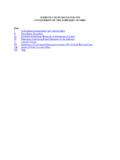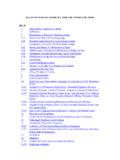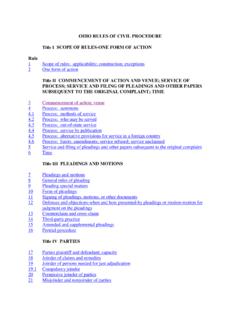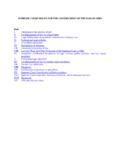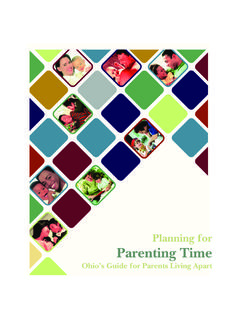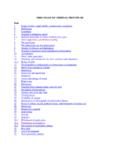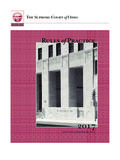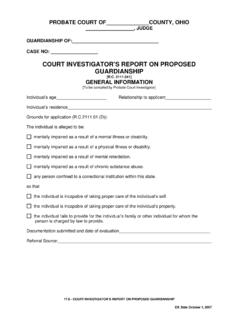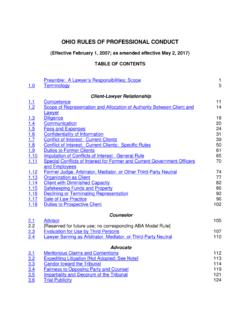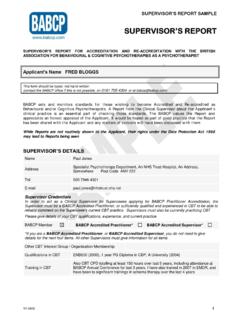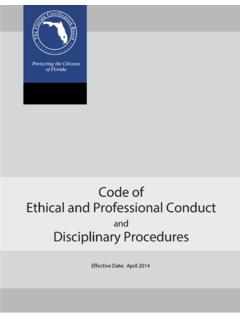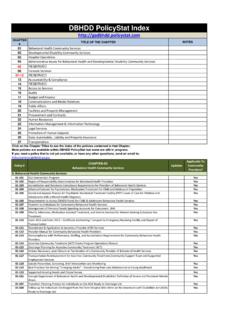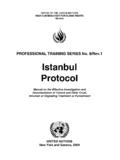Transcription of CODE OF JUDICIAL CONDUCT - Supreme Court of Ohio
1 code OF JUDICIAL CONDUCT (Superseded March 1, 2009) View the current code of JUDICIAL CONDUCT (effective March 1, 2009) CJC Preamble Preamble to code of JUDICIAL CONDUCT CJC Terminology Canon 1 A judge shall uphold the integrity and independence of the judiciary 2 A judge shall respect and comply with the law and shall act at all times in a manner that promotes public confidence in the integrity and impartiality of the judiciary 3 A judge shall perform the duties of JUDICIAL office impartially and diligently 4 A judge shall avoid impropriety and the appearance of impropriety in all of the judge s activities 5 [Reserved] 6 [Reserved] 7 Judges and JUDICIAL candidates should refrain from political activity inappropriate to JUDICIAL office Compliance with the code of JUDICIAL CONDUCT Effective date of compliance PREAMBLE TO code OF JUDICIAL CONDUCT The ohio code of JUDICIAL CONDUCT is intended to establish standards for ethical CONDUCT of judges.
2 It consists of broad statements called Canons, specific rules set forth in divisions under each Canon, a Terminology Section, a Compliance Section, and Commentary. The text of the Canons and the divisions, including the Terminology and Compliance Sections, is authoritative. The Commentary, by explanation and example, provides guidance with respect to the purpose and meaning of the Canons and divisions. The Commentary is not intended as a statement of additional rules. When the text uses "shall" or "shall not," it is intended to impose binding obligations the violation of which can result in disciplinary action.
3 When "should" or "should not" is used, the text is intended as hortatory and as a statement of what is or is not appropriate CONDUCT but not as a binding rule under which a judge may be disciplined. When "may" is used, it denotes permissible discretion or, depending on the context, it refers to action that is not covered by specific proscriptions. The Canons and divisions are rules of reason. They should be applied consistent with constitutional requirements, statutes, other Court rules and decisional law and in the context of all relevant circumstances. The code is to be construed so as not to impinge on the essential independence of judges in making JUDICIAL decisions.
4 The code is designed to provide guidance to judges and candidates for JUDICIAL office and to provide a structure for regulating CONDUCT through disciplinary agencies. It is not designed or intended as a basis for civil liability or criminal prosecution. Furthermore, the purpose of the code would be subverted if the code were invoked by lawyers for mere tactical advantage in a proceeding. The text of the Canons and divisions is intended to govern CONDUCT of judges and to be binding upon them. It is not intended, however, that every transgression will result in disciplinary action. Whether disciplinary action is appropriate, and the degree of discipline to be imposed, should be determined through a reasonable and reasoned application of the text and should depend on such factors as the seriousness of the transgression, whether there is a pattern of improper activity and the effect of the improper activity on others or on the JUDICIAL system and for the protection of the public.
5 [Effective: December 20, 1973; amended effective May 1, 1997.] TERMINOLOGY As used in Canons 1-4: " Court personnel" excludes the lawyers in a proceeding before a judge. "De minimis" denotes an insignificant interest that could not raise reasonable question as to a judge's impartiality. "Economic interest" denotes ownership of a more than de minimis legal or equitable interest, or a relationship as officer, director, advisor, or other active participant in the affairs of a party, except that: (1) Ownership of an interest in a mutual or common investment fund that holds securities is not an economic interest in those securities unless the judge participates in the management of the fund or a proceeding pending or impending before the judge could substantially affect the value of the interest.
6 (2) Service by a judge as an officer, director, advisor, or other active participant in an educational, religious, charitable, fraternal, or civic organization, or service by a judge's spouse, parent or child as an officer, director, advisor or other active participant in any organization does not create an economic interest in securities held by that organization; (3) A deposit in a financial institution, the proprietary interest of a policy holder in a mutual insurance company, or the proprietary interest of a depositor in a mutual proprietary interest is not an economic interest in the organization unless a proceeding pending or impending before the judge could substantially affect the value of the interest; (4) Ownership of government securities is not an economic interest in the issuer unless a proceeding pending or impending before the judge could substantially affect the value of the securities.
7 "Fiduciary" includes relationships such as executor, administrator, trustee, and guardian. " JUDICIAL candidate" has the same meaning as in Canon 7(A)(1). "Knowingly." A person acts knowingly, regardless of his or her purpose, when he or she is aware that his or her CONDUCT will probably cause a certain result or will probably be of a certain nature. A person has knowledge of circumstances when he or she is aware that those circumstances probably exist. "Law" denotes Court rules as well as statutes, constitutional provisions, and decisional law. "Member of the candidate's family" denotes a spouse, child, grandchild, parent, grandparent, or other relative or person with whom the candidate maintains a close familial relationship.
8 "Member of the judge's family" denotes a spouse, child, grandchild, parent, grandparent, or other relative or person with whom the judge maintains a close familial relationship. "Member of the judge's family residing in the judge's household" denotes any relative of a judge by blood or marriage, or a person treated by the judge as a member of the judge's family, who resides in the judge's household. Nepotism is the bestowal of patronage by a judge in appointing any of the following to positions by reason of blood or marital relationship to the judge: spouse, parent, child, grandparent, grandchild, brother, sister, uncle, aunt, nephew, niece, or great-grandparent.
9 "Nonpublic information" denotes information that, by law, is not available to the public. Nonpublic information includes but is not limited to: information that is sealed by statute or Court order, impounded, or communicated in camera; and information offered in grand jury proceedings, presentencing reports, dependency cases, or psychiatric reports. "Require" means a judge is to exercise reasonable direction and control over the CONDUCT of those persons subject to the judge's direction and control. The rules prescribing that a judge "require" certain CONDUCT of others are, like all of the rules in this code , rules of reason. "Third degree of relationship.
10 " The following persons are relatives within the third degree of relationship: great-grandparent, grandparent, parent, uncle, aunt, brother, sister, child, grandchild, great-grandchild, nephew, or niece. CANON 1 A Judge Shall Uphold the Integrity and Independence of the Judiciary An independent and honorable judiciary is indispensable to justice in our society. A judge should participate in establishing, maintaining, and enforcing high standards of CONDUCT , and personally shall observe those standards so that the integrity and independence of the judiciary will be preserved. The provisions of this code are to be construed and applied to further that objective.
